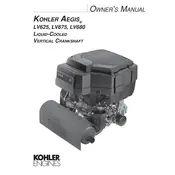Kohler LV680 Owner's Manual


The recommended oil type for the Kohler LV680 crankshaft is SAE 10W-30 for general use. Always check the manual for specific recommendations based on your operating environment.
It is recommended to change the oil every 100 hours of operation or annually, whichever comes first. Frequent oil checks are advised, especially in demanding conditions.
The crankshaft bolts for the Kohler LV680 should be torqued to 20-25 ft-lbs. Always refer to the service manual for precise specifications and procedures.
To replace the crankshaft seals, remove the engine from the equipment, disassemble the crankcase, and carefully remove the old seals. Install new seals ensuring they are seated properly, then reassemble the engine.
Inspect the crankshaft for wear, check connecting rod bearings, and ensure that the flywheel is properly torqued. Listen for specific sounds and refer to the service manual for further diagnostics.
Regular maintenance includes checking and replacing oil, inspecting the crankshaft for wear or damage, and ensuring proper torque on all fasteners. A full inspection every 500 hours is recommended.
Align the crankshaft by ensuring the timing marks on the crankshaft gear and camshaft gear are properly aligned. Use a feeler gauge to check clearances and adjust as necessary.
Oil leaks can be caused by worn crankshaft seals, excessive crankcase pressure, or improper gasket installation. Inspect and replace seals and gaskets as necessary.
Remove the crankshaft and place it on V-blocks. Use a dial indicator to measure runout. If it exceeds the manufacturer's specifications, the crankshaft may need to be replaced or machined.
Yes, synthetic oil can be used in the Kohler LV680, provided it meets the specifications outlined in the owner's manual. Synthetic oil can offer better protection and performance in extreme temperatures.